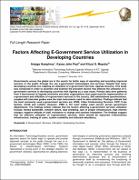Factors affecting e-government service utilization in developing Countries

View/
Date
2016-09Author
Anjoga, Humphrey
Kasse, John Paul
Mayoka Kituyi, Geoffrey
Metadata
Show full item recordAbstract
Governments across the global are in the search for better ways of operating and providing improved
services to the public through the use e-government technologies and services. Despite that many
developing countries are crippling on utilization of e-government services, Uganda inclusive. This study
was conducted in order to ascertain and examine the prevalent factors that affected the utilization of egovernment
services in developing countries with Uganda as a case study. Primary data were gathered
from 5 Government of Uganda ministries and other organizations that supervised the implementation of
e-government and utilization of e-government services in the country. Self administered questionnaires,
coupled with interview guides were the main instruments used for data collection. Findings indicate that
the most commonly used e-government services are; IFMS, Video Conferencing Services, VOIP, E-tax
System, CCAS and LoGICs. However, IFMS is the most widely used service across government
departments. The findings further indicate that the factors affecting e-government services utilization
include; limited bandwidth, network failure, load shedding, lack of proper infrastructure, high internet
charges, negative attitude of staff, resistance to change and systems breakdown. The findings suggest
that for effective utilization of e-government services, there should be improved e-Government
infrastructure, training of users, system scalability and reduced redundancy.
